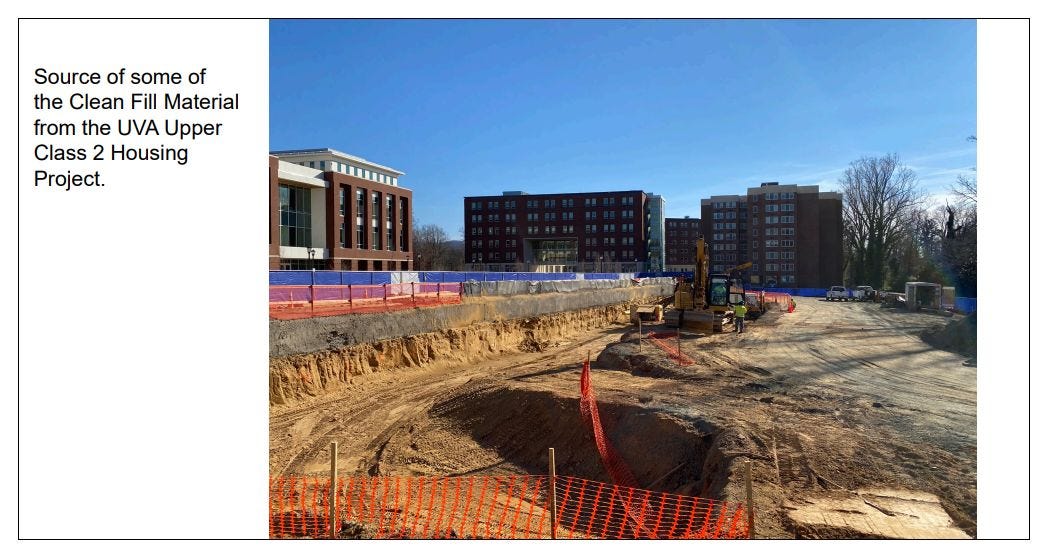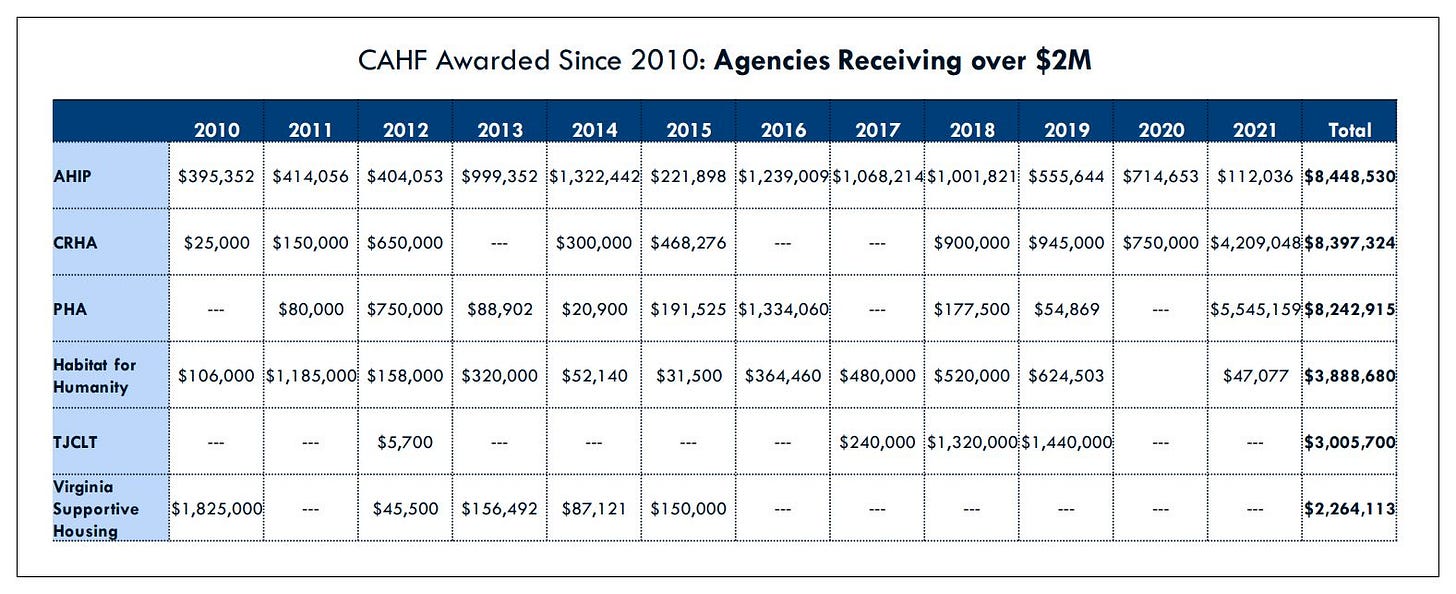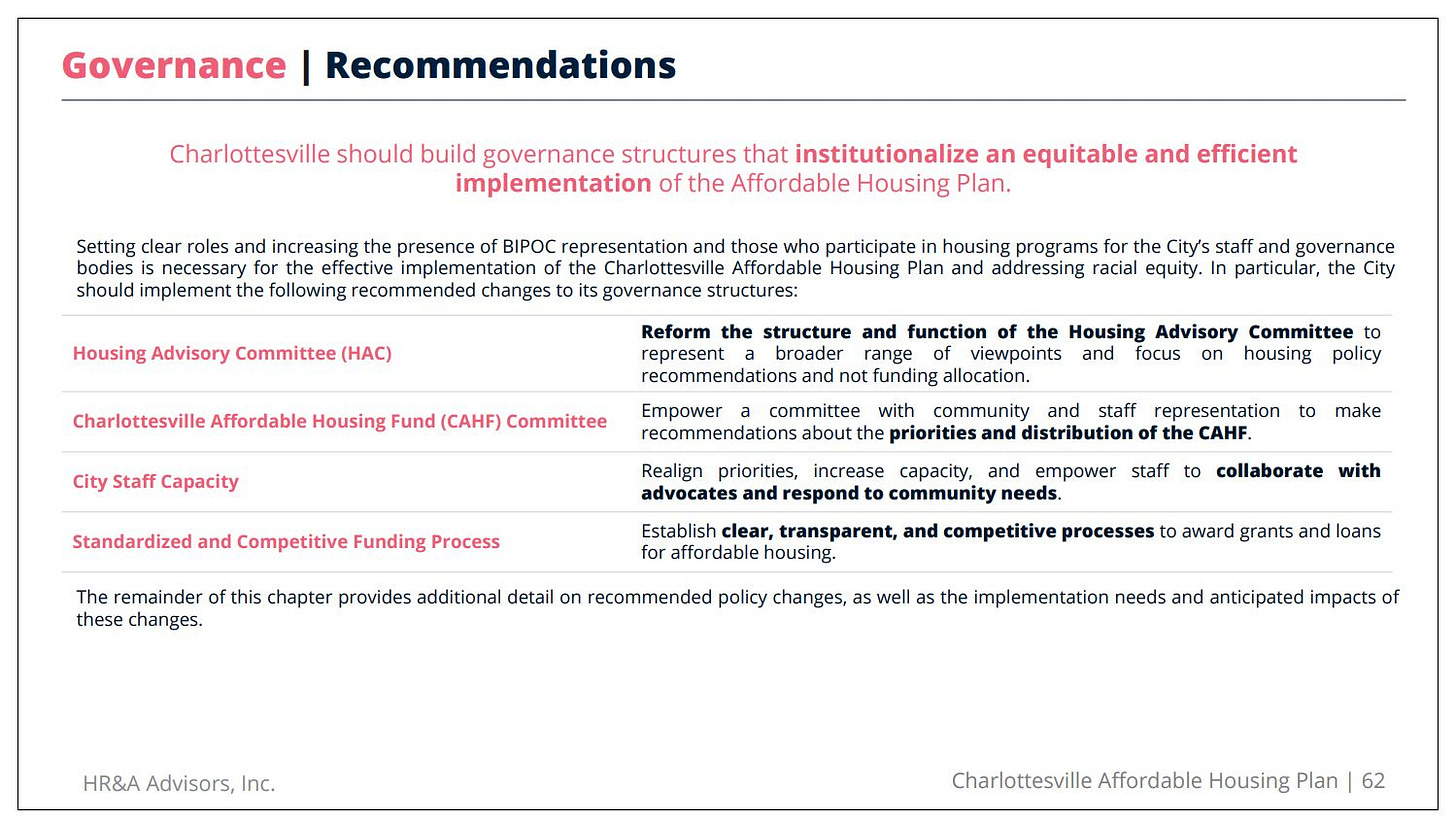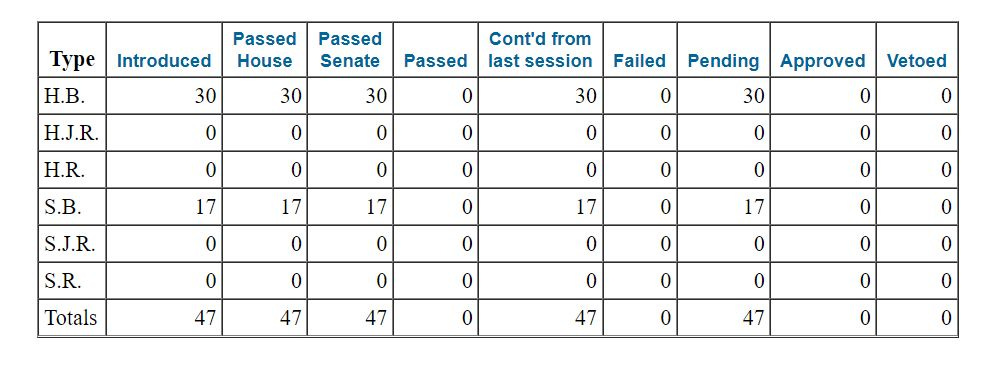It’s the fifth of Tuesday of the month, and what does that signify to you? For me, it’s a rare pause of sorts that allows me to catch up with items I’ve not been able to write about just yet. That’s the general theme of this installment of Charlottesville Community Engagement. I’m your host Sean Tubbs, grateful for the opportunity to bring you as much information as I can in newsletter and sonic form.
On today’s show:
Charlottesville City Council takes a deeper look at how $46 million in affordable housing funds have been spent since 2010
There are six days until the General Assembly meets again to finish the state budget
A nearby Board of Supervisors has a land use decision overturned by a Circuit Court judge
An update on mulch, clean-fill, and the budget for the Rivanna Solid Waste Authority
Today’s first Patreon-fueled shout-out goes to LEAP
You don’t need the “luck of the Irish” to be safe and comfortable in your own home. To see what you can do to get the most out of your home, contact LEAP, your local energy nonprofit, to schedule a home energy assessment this month - just $45 for City and County residents. LEAP also offers FREE home weatherization to income- and age-qualifying residents. If someone in your household is age 60 or older, or you have an annual household income of less than $74,950, you may qualify for a free energy assessment and home energy improvements such as insulation and air sealing. Sign up today to lower your energy bills, increase comfort, and reduce energy waste at home!
General Assembly reconvenes next Monday for special session
Virginia’s Legislative Information System has been updated to reflect that the General Assembly will convene next Monday for a special session to complete the biennial budget. There are 30 House Bills pending and 17 Senate bills. There’s also the possibility of more being added.
“Typically, the GA will approve an operating resolution that guides its work, including if/what legislation can be considered,” said David Blount, legislative liaison for the Thomas Jefferson Planning District Commission. “Typically, they will allow commending and memorial resolutions to be introduced.”
The main unresolved issue is the state budget. Each House has named members to be conferees to work on a compromise. Blount said the public will have a chance to review aht document as soon as a deal is worked out.
As the regular session ended, both the House and Senate have differing positions on how to increase funding for school facility construction and renovations. Legislation to allow all Virginia localities to levy a sales-tax increase for education did not make it out of the regular session. (House Subcommittee kills school sales-tax bills, February 25, 2022)
Solid waste update: How much Mulch madness? Two thousand tons!
This one is not a shout-out, but an update.
This year’s winter storms wreaked havoc on many trees across the region, and there was much debris for government crews and property owners. In January, the Rivanna Solid Waste Authority waived fees to drop off downed limbs and trees at the Ivy Materials Utilization Center where it was turned into mulch.
“We had so much mulch available after the free vegetative debris disposal program from the storm in January that we had so much mulch, we were giving away the first two tons and then charging people after that,” said Bill Mawyer, the executive director of the RWSA and the Rivanna Water and Sewer Authority.
Mawyer said the RSWA wanted to get rid of the material as quickly as possible before it became a fire hazard. As of this morning they’ve distributed 2,004 tons according to Phil McKalips, the RSWA’s Solid Waste Manager. He said they are hoping to run out by the end of next week.
Clean-fill pilot considered a success
Since February, the RSWA has been working with Faulconer Construction on a pilot project to have lower tipping fees for “clean fill” from sites where buildings and old landscapes have been removed. This is in response to new rules in Albemarle County, a locality that until recently allowed that material to more easily be buried underground. The lower fees are because Faulconer is doing some of the work.
“The contractor that brings in the fill is going to take responsibility for all of the grading, compaction, seeing, and installation of interim stormwater controls,” said Philip McKalips, the solid waste manager for RSWA.
As of last week, Faulconer had dropped off 17,000 tons that will be placed in an unused cell of the former landfill.
“In total they’re expected to deliver between 30,000 to 40,000 tons by the end of May,” McKalips said. “They might get done with that a bit sooner.”
One lesson learned is that the RSWA has needed to limit the number of trucks that can come through in a day to 120.
“We had up to 165 trucks in one day and with our other operations it was a bit of a stress for the site staff,” McKalips said. “They were having to do a lot of crowd control and managing traffic out towards Dick Woods Road and things that are not acceptable for long-term operations.”
Even though the tipping fee for clean-fill is lower, the pilot project has brought in over $60,000 in revenues to date. McKalips said other contractors are very interested in participating in the program.

At their meeting on March 22, the RSWA Board of Directors also got the first look at the agency’s $6.84 million budget for FY23. That’s based off of an anticipated $3.53 million in revenues and $3.3 million from local and state government. Albemarle County pays 82.2 percent of that amount, Charlottesville pays 15.3 percent, and the University of Virginia pays 2.4 percent.
Albemarle’s share is increasing next year to help cover the costs of operating the new Southern Convenience Center which is expected to open next January. There’s also a need to build a new baling facility to handle recycled paper and cardboard. A cost share will need to be worked out for how much each locality would pay. More details will be available at the RSWA’s next meeting in May.
To learn more about the programs of the RSWA, take a look at the budget presentation from the March 22, 2022 meeting. (view the budget presentation)
Second shout-out goes to the Rivanna Conservation Alliance
In today’s first Patreon-fueled shout-out, the Rivanna Conservation Alliance wants wildlife and nature photographers to enter their first-ever photography contest! They want high-resolution photos related to the Rivanna watershed and the winning entries will be displayed at the 2022 Riverfest Celebration on May 1. The two categories are 16 and under, and those over the age of 17. You can send in two entries, and the work may be used to supplement Rivanna Conservation Alliance publications. For more information, visit rivannariver.org.
Charlottesville City Council discusses reform for affordable housing fund
The Affordable Housing Plan adopted by Charlottesville City Council in March 2021 established a moral commitment for the city to spend $10 million each year on affordable housing projects and administration. But how have previous funds for that purpose been spent since 2010?
“In summary, you’ve administered $46.7 million in funding [and] this is broken down into operating, program, development, and city administration,” said Callahan Seltzer, a principal with HR&A Advisors. “And when we see development here, we’re talking about new construction and rehab, so specific hard costs related to construction and rehab of affordable housing.”
HR&A Advisors were hired by Rhodeside & Harwell as a subcontractor for the overall Cville Plans Together initiative. HR&A wrote the plan, which helped inform the greater residential densities allowed under the new Comprehensive Plan adopted by Council last November.
City Council originally approved a Charlottesville Affordable Housing Fund (CAHF) in 2007. Very few staff who were around at the time are left in the city government.
Last July, the previous City Council agreed to pay HR&A Advisors an additional $165,000 to review how the CAHF has been used since 2010. The review’s purpose was to determine if the city was getting a return on its investment and to suggest reform. An initial review was presented to Council in December, but the rest of the report was the subject of a City Council work session on March 21.
“The study is also designed to redesign the program to make it more efficient and then to show some kind of accountability moving forward,” said Alex Ikefuna, the interim director of the Office of Community Solutions.
That $165,000 also covers the costs of HR&A to write an inclusionary zoning program as part of the ongoing rewrite of the zoning code. That will come forward at a later date.
Seltzer said the review involved following up with transactions from the past 12 years. Around 95 percent of the funds have gone to eleven recipients.
There are two classes of recipients and they are households served versus units constructed. The study sought to create a metric to measure the efficiency of funding.
“We think it’s only one of many important metrics, and generally performance in terms of cost efficiency per unit, from what we see in the industry is very good,” Seltzer said. “You are getting a good amount of cost-efficiency per unit via the CAHF.”

Nearly half of the funding has gone to development of new units. Some highlights:
In 2010, Virginia Supportive Housing was awarded $1.825 million for what would become the Crossings on 4th Street. There are 60 single-resident occupancy units there.
The Thomas Jefferson Community Land Trust has been awarded $3 million since 2012. The land trust is now part of the Piedmont Housing Alliance.
Habitat for Humanity has received nearly $3.9 million since 2010 for a variety of projects.
Piedmont Housing Alliance received $5.545 million in 2021 for the Friendship Court redevelopment
Charlottesville Redevelopment and Housing Authority has received a total of nearly $8.4 million, with significant amounts earmarked for redevelopment since 2018.
The Albemarle Housing Improvement Program has received a total of $8.448 million primarily for rehabilitation of existing units.
Construction that is intended to subsidize the cost of housing always has multiple sources of revenue, but the above is direct investment of funds ultimately covered by city taxpayers either in terms of cash or bond proceeds.

Callahan said the review of the CAHF is intended to turn goals of the Affordable Housing Plan into reality, such as requiring affordability for as long as possible.
“So really trying to get 99 years of affordability whenever possible and we are working to help you get the right sight of agreements in place with your grantees that get you that longer term of affordability,” Seltzer said. “Twenty years at an absolute minimum would be our recommendation there.”
Those can take the form of covenants that return some of the value of the unit back to the city. One way to secure those covenants would be to restructure the Charlottesville Affordable Housing Fund as what Seltzer calls a “soft loan.”
“What that does is essentially bind that affordability and if a developer in ten or fifteen years decides they own the property, they have a covenant, but they’re okay to terminate that covenant because they’re going to sell the property and make a lot of money when they sell it,” Seltzer said. “It brings you back to the table to renegotiate and say, well, actually this is a loan. We paid for it as a loan and here you are needing to basically within your sale, we are going to recoup these funds so that we can reinvest in affordable housing in other ways.”
Seltzer said the city will need additional housing staff to track all of the information and to ensure the covenants and provisions are enforced.
One Councilor asked HR&A to give a sense of how Charlottesville is doing compared to other cities across the country.
“Charlottesville is punching above its weight on a per capita basis,” said Philip Kash of HR&A Advisors. “Almost any way you cut the numbers, you are very committed to this public policy priority.”
“You also have a very sophisticated group of affordable housing developers that I have not seen that level of sophistication in the southeast,” Seltzer said. “I think in Boston, New York, places where you have strong neighborhood-based [Community Development Corporations] with a 30 or 40 year history of neighborhood-based action. That exists, but it doesn’t exist in the southeast.”
However, both Kash and Seltzer said the administration of those funds has been lacking and better tracking will be required.
Deputy City Manager Sam Sanders said it is the intention of the city government to hire additional staff when the right positions are identified.
CAHF committee to be created
Another reform will be the creation of a committee to review competitive proposals for use of the city’s affordable housing funds. Council currently makes the ultimate decision with some guidance from the current Housing Advisory Committee. The new CAHF committee has not yet been named. Sanders said this will eliminate conflicts of interest such as members of nonprofits evaluating their own proposals.
“When you have one committee that’s been evaluating the actual proposals then that in itself leads to various confusion so the establishment of the CAHF committee is an attempt to pull the developers out of the conversation where they may have a direct benefit so that there are others that are fully vetting out those proposals and making a recommendation separate and apart.”
The Housing Advisory Committee would continue existing as a body to discuss policy, but would no longer be involved with making funding recommendations. The goal is to have all affordable housing proposals come through one channel.
“Anyone making a request for a housing investment to the city of Charlottesville should come through one door,” Sanders said. “That request should be factored against everything else that is being considered and it gives us a better ability to track it.”
Responsibility for this will be transferred to the Office of Community Solutions.
There is another work session on April 4 that will focus on affordable housing issues in Charlottesville.

Rappahannock Board of Supervisors overruled in land use case
In Virginia, elected bodies usually have the final say in matters related to land use and zoning. However, property owners have the right to appeal decisions to state courts.
The Rappahannock News reports that a Rappahannock Circuit Court Judge has overruled that county’s Board of Supervisors in a case where a contractor had sought a special use exception to store equipment on land zoned agricultural. The five person board unanimously voted to deny the request in March 2020, citing traffic issues.
Contractor John Cappali appealed, and Julia Shanahan reports that Judge Jeanette Irby ruled the use would not have any impact on traffic. Rappahannock County may appeal the ruling. Read Shanahan’s story to learn more about the case. (read through materials March 2020 hearing)
Support Town Crier Productions!
Special announcement of a continuing promo with Ting! Are you interested in fast internet? Visit this site and enter your address to see if you can get service through Ting. If you decide to proceed to make the switch, you’ll get:
Free installation
Second month of Ting service for free
A $75 gift card to the Downtown Mall
Additionally, Ting will match your Substack subscription to support Town Crier Productions, the company that produces this newsletter and other community offerings. So, your $5 a month subscription yields $5 for TCP. Your $50 a year subscription yields $50 for TCP! The same goes for a $200 a year subscription! All goes to cover the costs of getting this newsletter out as often as possible. Learn more here!

















Share this post